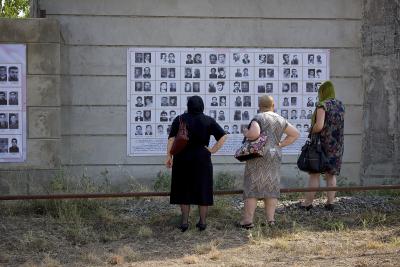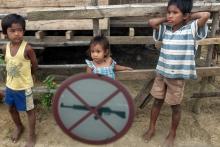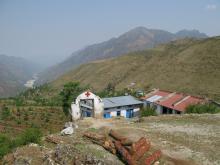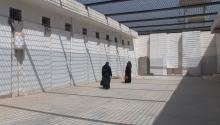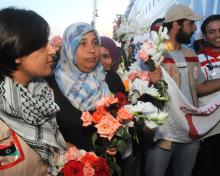Case prepared by Francesca Romana Ferrone, Joseph Gitata and Giovanni Medici Tornaquinci, LL.M. students at Roma Tre University under the supervision of Giulio Bartolini (IHL Professor), Tommaso Natoli and Alice Riccardi (Research assistants), Roma Tre University IHL Legal Clinic.
A. EFFORTS TO CLARIFY THE FATE OF MISSING PERSONS
[…]
Disappearance of people occurs more excessively in conflict-affected countries the world over. The ICRC is currently addressing the issue in the South Caucasus where, in Georgia, more than 2,300 persons are still reported missing as a result of armed conflicts in the 1990s and in August 2008. Our approach is of a purely humanitarian nature and includes efforts to prevent disappearances, locate the whereabouts of missing persons and, if deceased, to identify and hand over the human remains to the families. This allows them to hold proper funeral ceremonies and mourn their loved ones.
[…]
The right to know
The ‘right to know’ the fate of a relative is a fundamental tenet of both international humanitarian law and human rights law and must be respected. The legal obligations are laid out in the Geneva Conventions of 1949 and their Additional Protocols of 1977, along with the International Convention for the Protection of All persons from Enforced Disappearance. International law is clear: it is illegal to make people disappear, and the next-of-kin must be informed about captured, wounded or deceased relatives without delay. The challenge is to ensure that states adopt and implement such rules.
In Georgia, the ICRC has been working on the problem of missing persons since 2004. In 2010 we succeeded in setting up two coordination mechanisms for clarifying the fate of persons missing in relation to the armed conflicts of the 1990s and August 2008, and their aftermaths.
Abkhaz and Georgian participants in one forum, and South Ossetian, Russian and Georgian participants in a second forum, work to provide answers for the families of missing persons. The sole purpose of these platforms is to clarify, on purely humanitarian grounds, the fate and whereabouts of those who, several years after the conflicts, are still unaccounted for. Safeguarding this humanitarian process from any political agenda is highly important.
Despite the complexity of the issue, the work achieved so far has brought concrete results. Between 2013 and 2015, the human remains of 162 people were recovered from 22 grave-sites located throughout the region; 81 of the remains have so far been identified and handed over to their families.
Growing awareness of the problem
In its capacity as a neutral intermediary and its role as chair of these mechanisms, the ICRC is directly involved in all stages of the process. Gathering and consolidating information on gravesite locations and collecting ante-mortem data and biological reference samples from the families of missing persons are essential for the purpose of forensic human identification.
The ICRC also engages with a team of Argentinian forensic experts to assess potential gravesite locations, recovery, analysis and identification of human remains.
In addition, the ICRC accompanies the families of missing persons throughout the process, supporting their psychological, legal, administrative and economic needs. The Georgia Red Cross Society, local non-governmental organizations and a number of enthusiastic individuals also lend support. To date, more than 1,100 families of missing persons in Georgia have benefited from ICRC micro-economic initiative projects, improving their livelihoods and helping them to become self-sufficient.”
[…]
B. TENTH MEETING ON ICRC COORDINATION MECHANISM FOR CLARIFYING THE FATE OF MISSING PERSONS
The tenth meeting of the coordination mechanism for clarifying the fate and whereabouts of people who have been missing since the conflicts of the 1990s and August 2008 and their aftermath took place under the auspices of the International Committee of the Red Cross (ICRC) on 15 December 2016 in Versoix, Switzerland.
Georgian, South Ossetian and Russian participants gathered at the meeting, chaired by the ICRC in its capacity as neutral intermediary, to discuss future steps to be taken to provide the families of the missing with answers about what happened to their loved ones.
“It is very encouraging to see the progress that has been made since the mechanism's work resumed in February,” said Séverine Chappaz from the ICRC, who chairs the coordination mechanism. “This has enabled the participants to make plans today to excavate some potential grave-sites in 2017,” she continued, highlighting that the meeting took place in a very constructive atmosphere.”
[…]
C. GEORGIA AND SOUTH OSSETIA: JOINT EFFORTS TO IDENTIFY DEAD BODIES
Counting the missing
[…]
There are also 140 people missing from the Georgia–South Ossetia conflicts in 1989–1992, and about 50 from the 2008 war.
The International Committee of the Red Cross defines a missing person as someone who went missing during conflict and whose family does not have information about their fate from reliable sources.
‘Each party to the conflict must take all feasible measures to account for persons reported missing as a result of armed conflict and must provide their family members with any information it has on their fate’, the [International Committee of the] Red Cross states.
A cross border effort
In 2010, The Red cross set up a mechanism to collect information about missing persons, working with Georgia, South Ossetia, and Russia to do so. […]
The [International Committee of the] Red Cross began in early May to exhume two mass graves near Gori and one in Kaspi Gori to find the bodies of people who went missing in the conflicts of the 1990s and in 2008.
They plan to exhume more than 30 possible burial sites in 2017, in Shida Kartli, Imereti, Abkhazia, and near Tbilisi. They expect to find around 150 bodies.
Farrukh Islomov, who chairs [the International Committee of the] Red Cross in South Ossetia, informed the public there about the exhumations near Gori and Kaspi during a press-conference on 2 June in Tskhinvali, at the offices of Sputnik Ossetia. He said that there are 177 people on a common list of missing persons from the conflicts of 1990s and in 2008.
After the August 2008 war, the previous government reported the discovery of a mass grave containing Georgian military servicemen near Tamarasheni, which is in South Ossetia. They reported that it was not possible to exhume the site due to the political situation.
However, Kardava assured OC Media that the mechanism is free of political influences, and that all parties have been cooperating fruitfully to solve this humanitarian issue, adding that the [International Committee of the] Red Cross doesn’t discriminate based on the ethnicity of the missing. The only thing that’s important is that families get the bodies, she says. South Ossetia is ‘actively involved’.
David Sanakoyev, who chairs the Ossetian delegation at the Incident Prevention and Response Mechanism meetings, told OC Media that South Ossetia is actively involved in the Red Cross coordination mechanism, and that it has been very productive. He said that exhuming burial sites gives hope to families that they will finally find the remains of their loved ones. Sanakoyev says that since August 2008, South Ossetia has been looking for the eight missing people. Speaking of the burial sites in Tamarasheni that previous government spoke of, Sanakoyev said only that the next stage of the searches for the missing will proceed in South Ossetia.
[…]
D. STATEMENT OF SUPPORT FOR THE ICRC MISSING PERSON EFFORTS BY GEORGIAN PRIME MINISTER GIORGI KVIRIKASHVILI
[…]
Georgia’s Prime Minister Giorgi Kvirikashvili has appealed to anyone having information on people who went missing due to the 1992-1993 war in Abkhazia region and 2008 Russia-Georgia war to inform the International Committee of the Red Cross (ICRC).
The PM made the statement in response to the recent identification and transportation of 25 bodies to Georgia from the country’s breakaway Abkhazia region.
[…]
‘Hundreds of families have been still searching their loved ones for more than 20 years. Thus, I want to appeal to all who may have any information over the disappeared to share what they know with the International Committee of the Red Cross. […]
Discussion
I. Classification of the Situation and Applicable Law
1. How would you classify the situations in Georgia in the 1990s and in 2008? Who were the parties to the conflict? What additional information would you require in order to make such a determination?(
GC I-IV, Arts 2,
3;
P I, Art. 1;
P II, Art. 1)
2. Does the classification of the situation matter for determining whether IHL was respected in this case?
II. Clarifying the Fate of Missing Persons
3. What are the obligations of the parties to the conflict with respect to missing persons and their next-of-kin?
b. When persons are reported missing what steps should parties to the conflict take to clarify the fate of such persons? What does IHL say about ‘the right to know’? (
P I, Art. 33)
4. What are the obligations of parties to an international armed conflict with regards to the dead? How do these obligations relate to the duty to clarify the fate of missing persons? Are the parties to the conflicts obliged under IHL to return the remains of the dead to their family members? Are the relevant rules also applicable in non-international armed conflicts? (
GC I, Arts 15,
16,
17; GC IV, Arts.
16,
129,
130,
131;
P I, Art. 34;
P II, Art. 8; CIHL, Rules
112,
113,
114,
115,
116)
5. What are the measures that the ICRC may undertake with regard to dead persons? How does the role of the ICRC relate to the primary obligation of States vis-à-vis the missing persons and their next-of-kin?
III. Elements Contributing to the Respect of IHL
6. (Documents A, B And C) What is the main purpose of the coordination mechanism in relation to the clarification of the fate of persons gone missing in relation to the conflicts in Georgia in the 1990s and in 2008? Why is it so important that such mechanisms are not politicized?
7. What are the aspects that make it is so crucial for the families, and the communities at large, to get information about missing persons? Can the pressure from the society composed of those affected by the phenomenon contribute to compliance of relevant IHL obligations by parties to the conflicts? How can they influence the behavior of those who have primary responsibilities under IHL?
8. What is the importance of an impartial and neutral organization such as the ICRC leading the coordination mechanism?
9. (Document D) What is the significance of the Georgian Prime Minister’s endorsement of the coordination mechanism? How can political leaders play a role in favoring compliance with IHL obligations?

